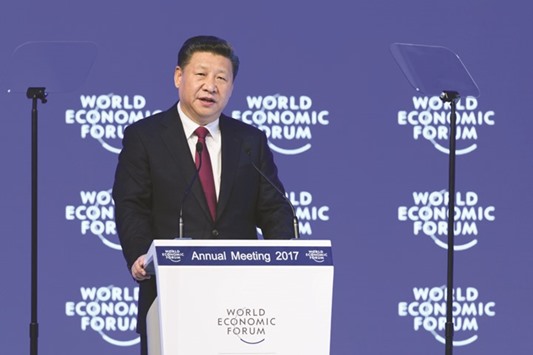Chinese President Xi Jinping cautioned against protectionism as he pushed back against criticism of globalisation by Donald Trump and other Western populists.
“Protectionism is like locking yourself in a dark room, which would seem to escape wind and rain, but also block out the sunshine,” Xi told the World Economic Forum yesterday, the first Chinese head of state to address the annual gathering in the Alpine resort town of Davos. “No one is a winner in a trade war.”
Xi used his speech to support a global economic order that has helped fuel China’s almost four-decade economic boom. While a surge in protectionist sentiment threatens to slow the engine of China’s growth, it also offers Xi a chance to advance his goal of shaping global economic systems. In his speech he did not refer to Trump by name.
The Chinese president called on the world’s business and political elite to address the problems of globalisation, without turning away from economic trends that have fuelled decades of growth. Leaders should address the excesses of growth, such as growing wealth gaps, while embracing new industries and innovation, he said.
“There is no point in blaming economic globalisation for the world’s problems because that is simply not the case,” Xi said. “And that will not help to solve the problems.”
“The history of mankind has shown us that problems are not to be feared,” Xi said. “What should concern us is the refusal to face up to the problems.”
The world’s second-largest economy represents a bastion of consistency to Davos attendees facing a string of European elections — in France, the Netherlands, Germany and possibly Italy — after the twin shocks of Trump’s victory and the UK’s Brexit vote. Such “extreme weather events” topped the list of most likely risks in the forum’s annual survey this year.
The president pledged to continue to overhaul China’s economic structure. He said he had no intention to devalue his country’s currency to boost competitiveness.
Since taking power in 2012, Xi has shown a desire to raise his profile on the world stage, addressing the UN in 2015 and hosting the Group of 20 nations last year. He’s touted China’s cooperation with outgoing US President Barack Obama on the Paris climate change deal — one of the multinational accords now questioned by Trump — as evidence of China’s support for sustainable global development.
Less than two weeks after Trump’s November win, Xi delivered a speech in support of free trade and globalisation at the Asia-Pacific Economic Cooperation summit in Lima, Peru. Trump, who is scheduled to be inaugurated in Washington on the final day of the Davos meeting, said he would withdraw from the 12-nation Trans-Pacific Partnership trade pact on his first day in office.
China remains the world’s big driver of economic growth despite its own slowdown, and was estimated to have accounted for almost 39% of global growth last year, according to the World Economic Forum.
He’s sought to leverage China’s economic strength into diplomatic clout with multinational initiatives such as the Asian Infrastructure Investment Bank and his signature “One Belt, One Road” plan to expand infrastructure along ancient trading routes to Europe. In September, Xi called for changes to international governance and advocated a bigger rule-making role for China in areas ranging from the Internet to outer space.
Arthur Kroeber, Beijing-based founding partner and managing director at Gavekal Dragonomics, said it was important for Xi to be visible among the international business community at Davos, which is “the samba party for the globalisation crowd.” The event also provided the president a platform to demonstrate his overseas clout back home, where Xi is preparing for a mid-term reshuffle of the party’s leadership ranks.
“It’s in Xi’s interests to take every opportunity he can and present himself as this leader who is powerful, strong and visionary, to give himself some international prestige,” said Kroeber, author of “China’s Economy: What Everyone Needs to Know.” Xi’s appearance at Davos, which has previous been attended by China’s premiers, is “consistent with the notion that Xi is now the only major authorised spokesman for the whole country.”
Xi’s entourage includes more than 80 business executives, such as Alibaba Group Holding founder Jack Ma, Dalian Wanda Group Co chairman Wang Jianlin and Baidu president Zhang Yaqin. Huawei Technologies Co chairwoman Sun Yafang, China Telecom Corp chairman Yang Jie and China Poly Group Corp chairman Xu Niansha are also on the guest list.
China set high expectations for Xi’s speech, which one top diplomat said would provide a “blueprint for the future progress of human society.” The country’s foreign ministry said the Davos trip would identify the deeper causes of sluggish world growth, present solutions and reinforce confidence in global development.
“Ready or not, China has become the de facto world leader seeking to maintain an open global economy and battle climate change,” the official China Daily said in a commentary on Friday that referred to the country “as the one major power with a global outlook.” “In effect, President Xi has become the general secretary of globalisation.”

China’s President Xi Jinping delivering a speech during the first day of the World Economic Forum in Davos yesterday. u201cProtectionism is like locking yourself in a dark room, which would seem to escape wind and rain, but also block out the sunshine. No one is a winner in a trade war,u201d Xi said.
